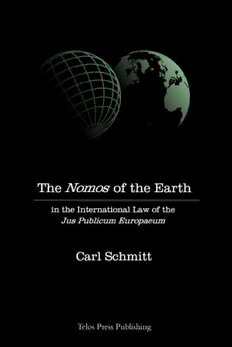
The Nomos of the Earth PDF
374 Pages·2006·17.049 MB·English
Most books are stored in the elastic cloud where traffic is expensive. For this reason, we have a limit on daily download.
Preview The Nomos of the Earth
Description:
The Nomos of the Earth is Schmitt's most historical and geopolitical book. It describes the origin of the Eurocentric global order, which Schmitt dates from the discovery of the New World, discusses its specific character and its contribution to civilization, analyzes the reasons for its decline at the end of the 19th century, and concludes with prospects for a new world order. It is a reasoned, yet passionate argument in defense of the European achievement - not only in creating the first truly global order of international law, but also in limiting war to conflicts among sovereign states, which, in effect, civilized war. In Schmitt's view, the European sovereign state was the greatest achievement of Occidental rationalism; in becoming the principal agency of secularization, the European state created the modern age. Since the problematic of a new nomos of the earth has become still more critical with the onset of the post-modern age and post-modern war, Schmitt's text is even more timely and challenging. Remarkable in Schmitt's discussion of the European epoch of world history is the role played by the New World, which ultimately replaced the Old World as the center of the earth and became the arbiter in European and world politics. According to Schmitt, the United States' internal conflicts between economic presence and political absence, between isolationism and interventionism, are global problems, which today continue to hamper the creation of a new world order. But however critical Schmitt is of American actions at the turn of the 20th century and after World War I, he considered the United States to be the only political entity capable of resolving the crisis of global order.
See more
The list of books you might like
Most books are stored in the elastic cloud where traffic is expensive. For this reason, we have a limit on daily download.
